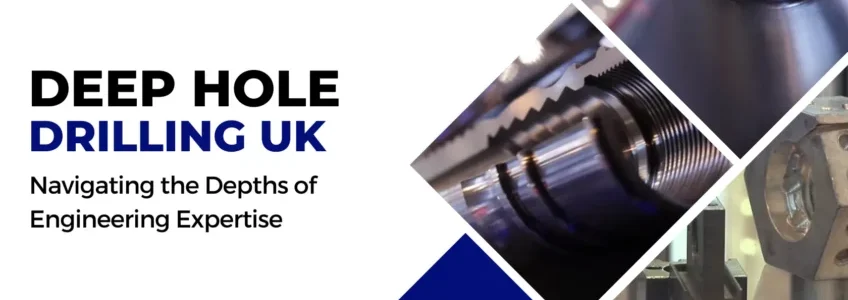The metal fabrication industry is experiencing a pivotal transformation, propelled by the integration of automation and robotics. This evolution is not just a trend but a necessity for businesses aiming to stay competitive in a rapidly advancing sector. The surge in technological adoption within metal fabrication underscores a commitment to precision, efficiency, and innovation.
Waterjet cutting has revolutionised the manufacturing industry, offering a myriad of advantages over traditional cutting methods. Among them, hydro-abrasive waterjet cutting stands out as a superior choice for a range of materials, including metal, stone, and glass. In this article, we take a look at the intricacies of this advanced technique, shedding light on its principles, advantages, applications, and comparisons with other cutting methods.
Deep hole drilling UK is an extraordinary engineering feat that captures the essence of technical brilliance in Britain. As the unsung hero of the UK’s industrial landscape, this remarkable technique holds a fascinating history and an exciting future that continues to captivate engineers, history aficionados, and technology enthusiasts alike.
Precision engineering technologies have come a long way since their inception, and their evolution is nothing short of an epic engineering saga. It all started with meticulous craftsmanship, and over the centuries, it has morphed into an advanced science, drastically altering the landscape of industrial development.
Harnessing the Potential of Smart Factories in Custom Fabrication
In recent years, the manufacturing industry has experienced a significant transformation with the rise of smart factories. These future-ready production facilities are equipped with cutting-edge technologies such as artificial intelligence (AI), Internet of Things (IoT), robotics, and big data analytics. Smart factories are revolutionising the way products are fabricated, offering many advantages in terms of efficiency, customisation and cost-effectiveness. In this article, we take a closer look at the concept of smart factories and dive deeper into their potential to shape the future of custom fabrication.
5-axis machining is a powerful tool for precision engineering, allowing manufacturers to create complex parts and components with extreme accuracy and efficiency. Precision engineering has always been an essential aspect of manufacturing, especially in industries such as aerospace, automotive and medical device manufacturing. In this article, we’ll explore the benefits of 5-axis machining, the different types, industry applications, 5-axis machining software and what the future of this technology might look like.
Mould tooling is a vital aspect of plastic manufacturing, and while the initial cost of producing the tool can be substantial, the economies of scale make it worth the investment. However, it’s still essential to avoid unnecessary expenses during the design for manufacturing (DFM) process. In this article, we take a closer look at some of PRV Engineering’s top tips for saving money on mould tooling.
Precision engineering is a crucial aspect of modern manufacturing, allowing for the creation of complex products with high levels of accuracy and reliability. The importance of precision engineering cannot be overstated, especially in industries such as aerospace and medical technology. In this article, we will explore the process of moving from blueprint to reality, highlighting the key role that precision engineering plays in this process.
CNC Milling Machines are used to shape metal and other solid materials using specialised cutting tools programmed and managed by Computer Numerical Control (CNC) systems. The machining process creates a specific part or product with the help of CAD software, short for Computer-Aided Design.
Today, you won’t find many items that haven’t gone through CNC milling machines as most sectors rely on this specialised process. Some examples are cars, aeroplanes, machine parts, moulds for household machines, toys and even prosthetics. All of these are likely to have one or several CNC-machined components.
Deep hole drilling services are beneficial across several applications and require specialist equipment to maintain straightness and tolerances second to none. Oil and gas exploration equipment, armaments, aerospace equipment and engines are amongst the most common applications for deep hole drilling and machining processes.
Each of these industries needs enhanced hole qualities that are necessary for high-performance end products, such as landing gear that easily retracts. In this article, PRV explores how gun drilling works and highlights some of the benefits of quality deep hole drilling services.











Recent Comments